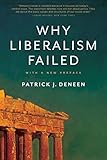Why liberalism failed / Book / Patrick J. Deneen ; foreword by James Davison Hunter and John M. Owen IV.
Material type: TextDescription: xxxi, 225 pages : 22 cmISBN:
TextDescription: xxxi, 225 pages : 22 cmISBN: - 9780300240023 (paperback)
- 320.51
- 320.51
| Item type | Current library | Call number | Status | Date due | Barcode | Item holds |
|---|---|---|---|---|---|---|
 Books
Books
|
Junaid Zaidi Library, COMSATS University Islamabad 2nd Floor | 320.51 DEN-W 62147 (Browse shelf(Opens below)) | Available | 10001000062147 |
Browsing Junaid Zaidi Library, COMSATS University Islamabad shelves, Shelving location: 2nd Floor Close shelf browser (Hides shelf browser)
"With a new preface." -- Front cover.
"Published with the assistance of the Institute for Advanced Studies in Culture, University of Virginia"--T.p. verso.
"Of the three dominant ideologies of the twentieth century--fascism, communism, and liberalism--only the last remains. This has created a peculiar situation in which liberalism's proponents tend to forget that it is an ideology and not the natural end-state of human political evolution. As Patrick Deneen argues in this provocative book, liberalism is built on a foundation of contradictions: it trumpets equal rights while fostering incomparable material inequality; its legitimacy rests on consent, yet it discourages civic commitments in favor of privatism; and in its pursuit of individual autonomy, it has given rise to the most far-reaching, comprehensive state system in human history. Here, Deneen offers an astringent warning that the centripetal forces now at work on our political culture are not superficial flaws but inherent features of a system whose success is generating its own failure." -- Provided by publisher.
All.









There are no comments on this title.